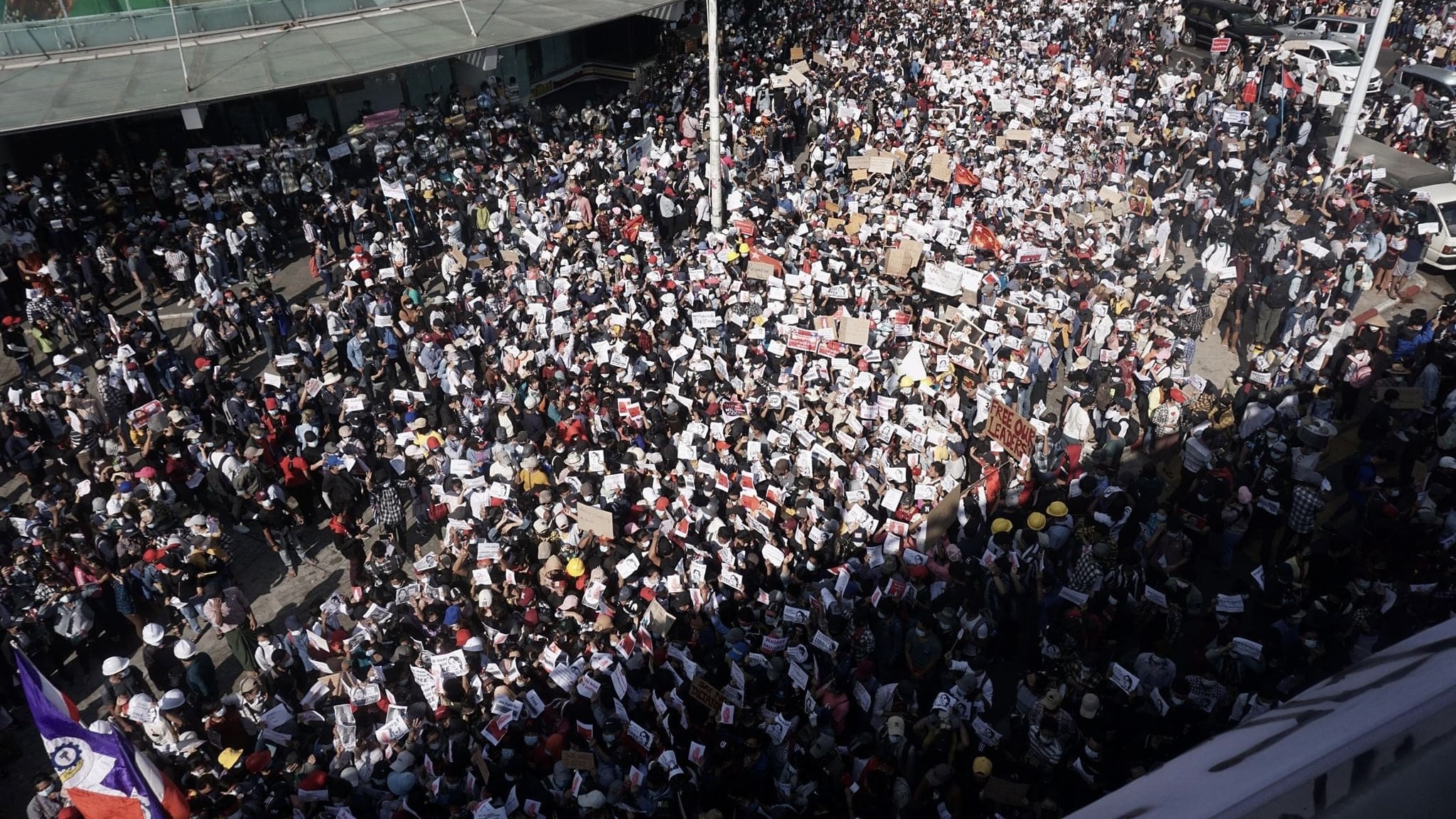As Myanmar enters its third year under military rule on February 1, the junta forces’ onslaught against any perceived opposition—whether trade unionists, rights activists, factory workers, or members of the People’s Defense Force—has caused “widespread fear and grave human rights violations” in the country.
Since the coup, at least 1.5 million people have been internally displaced, according to Amnesty International. Nearly 3,000 individuals lost their lives after being fired on by the military during the series of mass protests that spread across the country in 2021. Over 70,000 people have been forced to flee Myanmar, fearing for their lives, according to estimates by the Assistance Association of Political Prisoners (AAPP), and at least 100 individuals have been sentenced to death for opposing the legitimacy of the military’s rule.
With no end in sight to the ongoing political crisis, as many as 13,000 reportedly continue to languish in different prisons, despite the mass amnesty announced by the junta to impress the international community. Even today, Amnesty International reports that 7.8 million children remain out of school. The military claims to have brought stability to the region, but the entire country simmers under violent clashes, assaults, and fighting between the army and anti-coup forces.
As estimated by independent research group Data For Myanmar, the military in Myanmar destroyed or damaged 38,383 houses across 12 states and regions between May 2021 and November 2022.
Last week, thousands of locals were forced to flee the violence in the states of Karen and Kayah. In another incident, dozens of houses were torched after fighting in the Mandalay region on January 12. Less than a week later, at least seven more people were reportedly killed when the junta carried out airstrikes in Sagaing region on January 18.
Catastrophe and spiraling crisis
Ahead of the second anniversary of the coup, UN Human Rights Chief Volker Türk released a statement describing the “catastrophic situation” in the country under the rule of General Min Aung Hlaing, who toppled the civilian government in 2021.
Türk said that Myanmar has regressed in economic, social, and political terms following the coup. “Despite clear legal obligations for the military to protect civilians in the conduct of hostilities, there has been a consistent disregard for the related rules of international law,” he added.
“Far from being spared, civilians have been the actual targets of attacks—victims of targeted and indiscriminate artillery barrages and air strikes, extrajudicial executions, the use of torture, and the burning of whole villages,” Türk lamented.
Myanmar’s formal economy remains atrophied, with socio-political turmoil engulfing the entire country. In its latest report, the United Nations Office on Drugs and Crime also estimates that opium cultivation has risen abruptly in recent months, giving rise to black markets and illicit trade. The total area devoted to poppy cultivation last year was 40,100 hectares, the UN agency has said.
After seizing power, Hlaing adopted pro-capitalist policies to crush dissent emanating from within the country. The military has been given a free hand to do as it deems necessary, as well as immunity from accountability.
“Than Hlaing (a lieutenant-general who served as the Deputy Minister of Home Affairs and Chief of the Myanmar Police Force) personally oversaw police committing crimes against humanity following the coup attempt,” reveals the report ‘Developing a Dictatorship’ by Justice for Myanmar, an international pressure campaign against the military junta.
Under Hlaing’s supervision, police and government forces reportedly opened fire on thousands of protesters and torched a large number of villages to combat alleged militants. The police and armed forces are also said to have tortured detainees placed in preventive custody and carried out systematic forcible evictions and a number of airstrikes against alleged militant hideouts.
Despite massive opposition and international condemnation, the junta’s “ability to gain and retain power relies upon its military strength as well as its vast network of businesses and opaque financial and political ties,” the report says.
In its January 30 statement on two years of the coup regime, Amnesty International also insisted that states and private companies needed to do more to limit the direct and indirect supply of aviation fuel to Myanmar, at least until effective mechanisms are in place to ensure that it will not be used to carry out airstrikes against civilians.
This recommendation from Amnesty came just four days prior to the Justice for Myanmar report, which denounced the critical role played by international and developmental organizations and foreign governments “in legitimizing, funding, and resourcing Myanmar’s military junta.”
Noting that “a total of 64 governments and international organizations” had provided the junta with support, the report argued that the “junta’s potential to establish control over the country is underpinned by the vast resources at its disposal.”
Justice for Myanmar had also last year highlighted the fact that more than 100 foreign private companies had helped the junta procure arms.
International outrage
Internationally, outrage against the military junta’s actions has been growing, but with little to show for it so far. The UN Security Council passed a resolution on Myanmar on December 21, 2022, that the UN’s Special Rapporteur on Myanmar did not consider strong enough.
Meanwhile, in Germany, the human rights organization Fortify Rights, along with 16 individuals from Myanmar, has filed a criminal complaint with the Federal Public Prosecutor General of Germany against Myanmar’s generals for “genocide, war crimes, and crimes against humanity.” This includes the continued violence directed against Rohingya Muslims in Myanmar, which has been termed a “textbook example of ethnic cleansing” by the United Nations.
According to Ming Yu Hah, Amnesty’s Deputy Regional Director for Campaigns, the military junta was able to victimize the people of Myanmar because of an inadequate international response. She continued, “This anniversary should highlight the need for urgent global action from countries around the world and the Association for Southeast Asian Nations to protect the people of Myanmar, who remain under daily siege from the military.”





